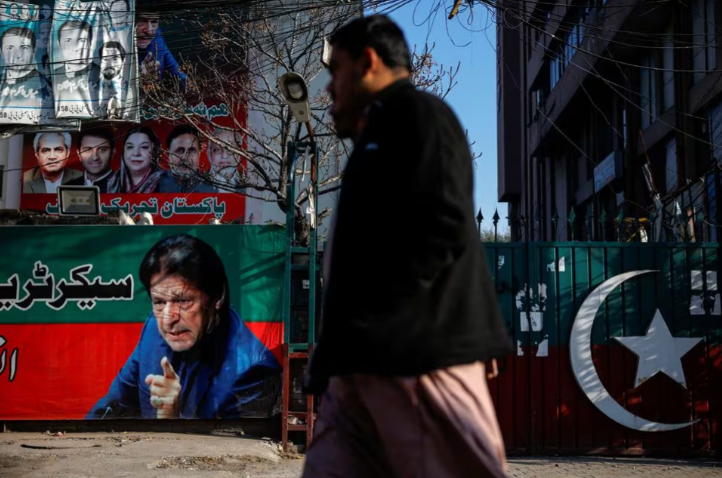Washington:
Foreign policy observers remarked that Pakistan’s election has been unusual in that it has yielded a result that has disappointed the majority of its foreign allies and adversaries, leaving little hope for the administration that would ultimately emerge from it.

Following an inconclusive vote last week, Pakistan’s two biggest political parties were compelled to work together in an attempt to build a coalition in the house, which is dominated by independents. Since then, they have been fighting over who will be prime minister.
The Pakistan Peoples Party (PPP), led by Bilawal Bhutto Zardari, the deceased former premier Benazir Bhutto’s son, and the Pakistan Muslim League-Nawaz (PML-N), neither gained enough seats to form a government on their own.
With 93 of the 264 parliamentary seats declared, independent candidates supported by former prime minister Imran Khan constitute the largest group. Many had anticipated that their performance would be significantly muted by a fierce crackdown on Khan and his party, so they were astonished by that.
However, Khan’s imprisonment prevents him from becoming prime minister, and his group is unable to form a government because they were only allowed to run as independents because his party was not allowed to stand.
According to several foreign policy experts, the election results most likely reflect voters’ disapproval of the nation’s strong military’s perceived political meddling. However, the military disputes that it meddles in national affairs.
Considering the military’s significant historical involvement in the security and foreign policy of the nuclear-armed nation, this further exacerbates the political unrest.
“For a while now, Pakistan has been experiencing a slight decline in prosperity. According to Frederic Grare, a specialist on South Asia at the National Security College of the Australian National University, “the slope is now much stiffer.”
“The military will most likely be able to manage the situation for some time but … the political situation is likely to be less and less stable.”
It’s a messy situation that no one wanted—not the United States, which has less interest in Pakistan after leaving Afghanistan in 2021, but is still worried about Islamist militancy as a larger source of instability in the region and beyond, analysts said, nor China, Pakistan’s principal foreign backer, nor India, Pakistan’s nuclear-armed neighbor and fierce rival.
It is also unclear if Pakistan will be able to implement the reforms required to obtain a crucial new International Monetary Fund program later this year given the likelihood of a weak and divided administration.
Separately last week, the US, the UK, and the EU voiced their worries over Pakistan’s election process and called for an investigation into any anomalies that had been detected. The acting prime minister of Pakistan denied those accusations.
The Middle Eastern countries are likely to be the only ones finding solace in the outcome.
“Imran Khan did not have a great relationship with many of Pakistan’s traditional Gulf partners,” according to Joshua White, who is currently teaching at the School of Advanced International Studies at Johns Hopkins University and was previously an adviser in the White House.
“I think the Saudis and the Emiratis are likely to be relatively comforted by the that he is locked away and that his party probably … will not form government in Pakistan.”
“More confusion and uncertainty”
Instead of ending the political crisis that Pakistan has been facing since Khan was removed in 2022, Tamanna Salikuddin, director of South Asia at the United States Institute of Peace think tank in Washington, claimed that the election “has created more confusion and uncertainty.”
“This election not only reveals the lack of trust that Pakistanis have in their leaders, but also it is evidence that no institution or leader has a plan to fix the economy, nor do they have the political capital to make any of the very difficult and painful reforms to turn around this failing economy,” she stated.
“Much of Pakistan’s debt is owed to the Chinese, and they will also be concerned about Pakistan’s lack of economic reforms.”
A significant component of Chinese President Xi Jinping’s flagship Belt and Road infrastructure program is the multibillion dollar China-Pakistan Economic Corridor.
CPEC has slowed down recently, and any new Pakistani administration would need to give it a strong mandate in order to get rid of bureaucracy and restart the project.
The top priority for a new government, according to Elizabeth Threlkeld, a former US diplomat in Pakistan who is currently affiliated with the Stimson Center think tank, is negotiating a new IMF pact.
“Any prolonged political uncertainty would complicate that process at a time when Pakistan can ill-afford delays,” she stated.
According to former Indian diplomats, Delhi was likely to adopt a “wait-and-watch” strategy as a result of the confusing poll result, which strained relations between India and its nuclear-armed adversary.
India’s high commissioner to Pakistan from 2009 to 2013, Sharat Sabharwal, stated that a new Pakistani government will find it challenging to advance relations with India.
“To proceed on that, political consensus is required. And there won’t be a consensus because your opponents would call you a sell-off the moment you take any action regarding India.”
Additionally, the US has been openly accused by Popular Khan of being a part of a plot to overthrow his administration. Washington has refuted any involvement in any such plot, and Khan has been found guilty despite his denials of having leaked diplomatic cables between Washington and Islamabad.
“The world community just wants a functioning government with some legitimacy in Pakistan after two years of turmoil,” stated Husain Haqqani, a senior fellow at the Hudson Center and a former Pakistani ambassador to Washington.
“They want to be able to deal with Pakistan without fear of normal diplomatic interaction being turned into a conspiracy theory.”










































